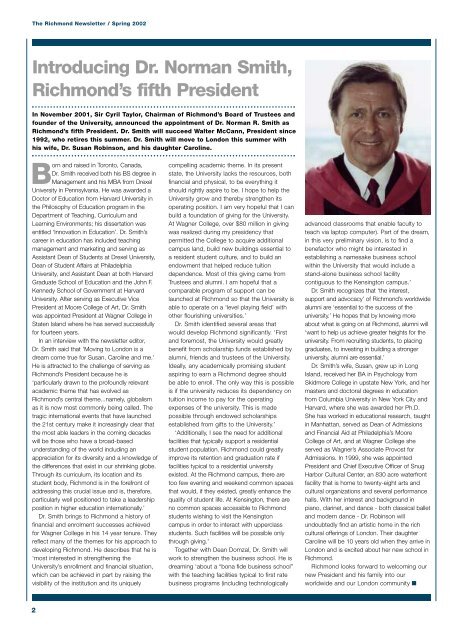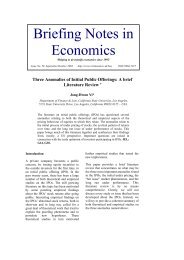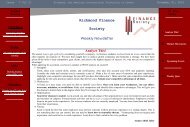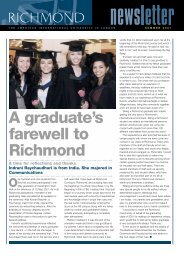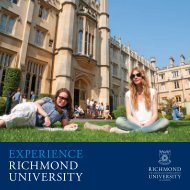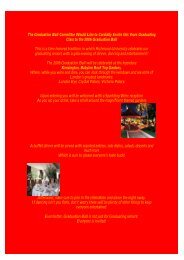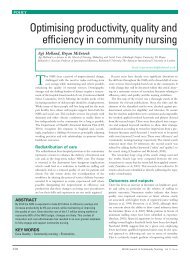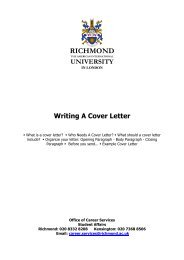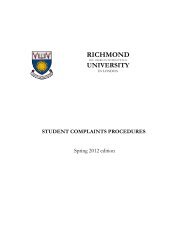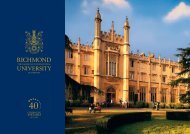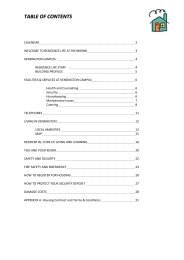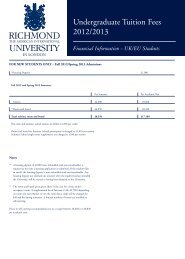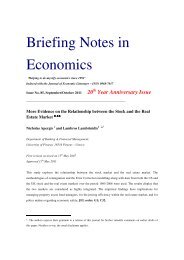Thirty years young and getting stronger - Richmond - The American ...
Thirty years young and getting stronger - Richmond - The American ...
Thirty years young and getting stronger - Richmond - The American ...
Create successful ePaper yourself
Turn your PDF publications into a flip-book with our unique Google optimized e-Paper software.
<strong>The</strong> <strong>Richmond</strong> Newsletter / Spring 2002<br />
Introducing Dr. Norman Smith,<br />
<strong>Richmond</strong>’s fifth President<br />
In November 2001, Sir Cyril Taylor, Chairman of <strong>Richmond</strong>’s Board of Trustees <strong>and</strong><br />
founder of the University, announced the appointment of Dr. Norman R. Smith as<br />
<strong>Richmond</strong>’s fifth President. Dr. Smith will succeed Walter McCann, President since<br />
1992, who retires this summer. Dr. Smith will move to London this summer with<br />
his wife, Dr. Susan Robinson, <strong>and</strong> his daughter Caroline.<br />
Born <strong>and</strong> raised in Toronto, Canada,<br />
Dr. Smith received both his BS degree in<br />
Management <strong>and</strong> his MBA from Drexel<br />
University in Pennsylvania. He was awarded a<br />
Doctor of Education from Harvard University in<br />
the Philosophy of Education program in the<br />
Department of Teaching, Curriculum <strong>and</strong><br />
Learning Environments; his dissertation was<br />
entitled ‘Innovation in Education’. Dr. Smith’s<br />
career in education has included teaching<br />
management <strong>and</strong> marketing <strong>and</strong> serving as<br />
Assistant Dean of Students at Drexel University,<br />
Dean of Student Affairs at Philadelphia<br />
University, <strong>and</strong> Assistant Dean at both Harvard<br />
Graduate School of Education <strong>and</strong> the John F.<br />
Kennedy School of Government at Harvard<br />
University. After serving as Executive Vice<br />
President at Moore College of Art, Dr. Smith<br />
was appointed President at Wagner College in<br />
Staten Isl<strong>and</strong> where he has served successfully<br />
for fourteen <strong>years</strong>.<br />
In an interview with the newsletter editor,<br />
Dr. Smith said that ‘Moving to London is a<br />
dream come true for Susan, Caroline <strong>and</strong> me.’<br />
He is attracted to the challenge of serving as<br />
<strong>Richmond</strong>’s President because he is<br />
‘particularly drawn to the profoundly relevant<br />
academic theme that has evolved as<br />
<strong>Richmond</strong>’s central theme...namely, globalism<br />
as it is now most commonly being called. <strong>The</strong><br />
tragic international events that have launched<br />
the 21st century make it increasingly clear that<br />
the most able leaders in the coming decades<br />
will be those who have a broad-based<br />
underst<strong>and</strong>ing of the world including an<br />
appreciation for its diversity <strong>and</strong> a knowledge of<br />
the differences that exist in our shrinking globe.<br />
Through its curriculum, its location <strong>and</strong> its<br />
student body, <strong>Richmond</strong> is in the forefront of<br />
addressing this crucial issue <strong>and</strong> is, therefore,<br />
particularly well positioned to take a leadership<br />
position in higher education internationally.’<br />
Dr. Smith brings to <strong>Richmond</strong> a history of<br />
financial <strong>and</strong> enrolment successes achieved<br />
for Wagner College in his 14 year tenure. <strong>The</strong>y<br />
reflect many of the themes for his approach to<br />
developing <strong>Richmond</strong>. He describes that he is<br />
‘most interested in strengthening the<br />
University’s enrollment <strong>and</strong> financial situation,<br />
which can be achieved in part by raising the<br />
visibility of the institution <strong>and</strong> its uniquely<br />
2<br />
compelling academic theme. In its present<br />
state, the University lacks the resources, both<br />
financial <strong>and</strong> physical, to be everything it<br />
should rightly aspire to be. I hope to help the<br />
University grow <strong>and</strong> thereby strengthen its<br />
operating position. I am very hopeful that I can<br />
build a foundation of giving for the University.<br />
At Wagner College, over $80 million in giving<br />
was realized during my presidency that<br />
permitted the College to acquire additional<br />
campus l<strong>and</strong>, build new buildings essential to<br />
a resident student culture, <strong>and</strong> to build an<br />
endowment that helped reduce tuition<br />
dependence. Most of this giving came from<br />
Trustees <strong>and</strong> alumni. I am hopeful that a<br />
comparable program of support can be<br />
launched at <strong>Richmond</strong> so that the University is<br />
able to operate on a ‘level playing field’ with<br />
other flourishing universities.’<br />
Dr. Smith identified several areas that<br />
would develop <strong>Richmond</strong> significantly. ‘First<br />
<strong>and</strong> foremost, the University would greatly<br />
benefit from scholarship funds established by<br />
alumni, friends <strong>and</strong> trustees of the University.<br />
Ideally, any academically promising student<br />
aspiring to earn a <strong>Richmond</strong> degree should<br />
be able to enroll. <strong>The</strong> only way this is possible<br />
is if the university reduces its dependency on<br />
tuition income to pay for the operating<br />
expenses of the university. This is made<br />
possible through endowed scholarships<br />
established from gifts to the University.’<br />
‘Additionally, I see the need for additional<br />
facilities that typically support a residential<br />
student population. <strong>Richmond</strong> could greatly<br />
improve its retention <strong>and</strong> graduation rate if<br />
facilities typical to a residential university<br />
existed. At the <strong>Richmond</strong> campus, there are<br />
too few evening <strong>and</strong> weekend common spaces<br />
that would, if they existed, greatly enhance the<br />
quality of student life. At Kensington, there are<br />
no common spaces accessible to <strong>Richmond</strong><br />
students wishing to visit the Kensington<br />
campus in order to interact with upperclass<br />
students. Such facilities will be possible only<br />
through giving.’<br />
Together with Dean Domzal, Dr. Smith will<br />
work to strengthen the business school. He is<br />
dreaming ‘about a “bona fide business school”<br />
with the teaching facilities typical to first rate<br />
business programs (including technologically<br />
advanced classrooms that enable faculty to<br />
teach via laptop computer). Part of the dream,<br />
in this very preliminary vision, is to find a<br />
benefactor who might be interested in<br />
establishing a namesake business school<br />
within the University that would include a<br />
st<strong>and</strong>-alone business school facility<br />
contiguous to the Kensington campus.’<br />
Dr. Smith recognizes that ‘the interest,<br />
support <strong>and</strong> advocacy’ of <strong>Richmond</strong>’s worldwide<br />
alumni are ‘essential to the success of the<br />
university.’ He hopes that by knowing more<br />
about what is going on at <strong>Richmond</strong>, alumni will<br />
‘want to help us achieve greater heights for the<br />
university. From recruiting students, to placing<br />
graduates, to investing in building a <strong>stronger</strong><br />
university, alumni are essential.’<br />
Dr. Smith’s wife, Susan, grew up in Long<br />
Isl<strong>and</strong>, received her BA in Psychology from<br />
Skidmore College in upstate New York, <strong>and</strong> her<br />
masters <strong>and</strong> doctoral degrees in education<br />
from Columbia University in New York City <strong>and</strong><br />
Harvard, where she was awarded her Ph.D.<br />
She has worked in educational research, taught<br />
in Manhattan, served as Dean of Admissions<br />
<strong>and</strong> Financial Aid at Philadelphia’s Moore<br />
College of Art, <strong>and</strong> at Wagner College she<br />
served as Wagner’s Associate Provost for<br />
Admissions. In 1999, she was appointed<br />
President <strong>and</strong> Chief Executive Officer of Snug<br />
Harbor Cultural Center, an 830 acre waterfront<br />
facility that is home to twenty-eight arts <strong>and</strong><br />
cultural organizations <strong>and</strong> several performance<br />
halls. With her interest <strong>and</strong> background in<br />
piano, clarinet, <strong>and</strong> dance - both classical ballet<br />
<strong>and</strong> modern dance - Dr. Robinson will<br />
undoubtedly find an artistic home in the rich<br />
cultural offerings of London. <strong>The</strong>ir daughter<br />
Caroline will be 10 <strong>years</strong> old when they arrive in<br />
London <strong>and</strong> is excited about her new school in<br />
<strong>Richmond</strong>.<br />
<strong>Richmond</strong> looks forward to welcoming our<br />
new President <strong>and</strong> his family into our<br />
worldwide <strong>and</strong> our London community ■


